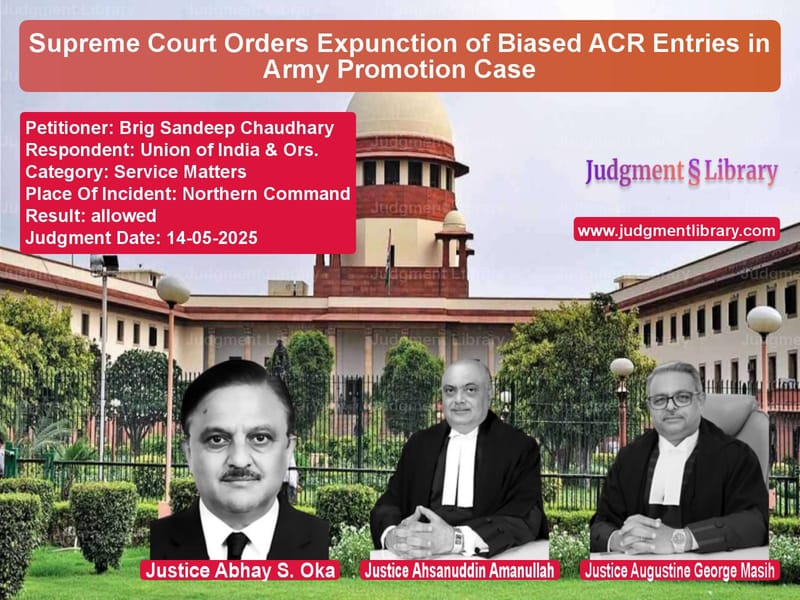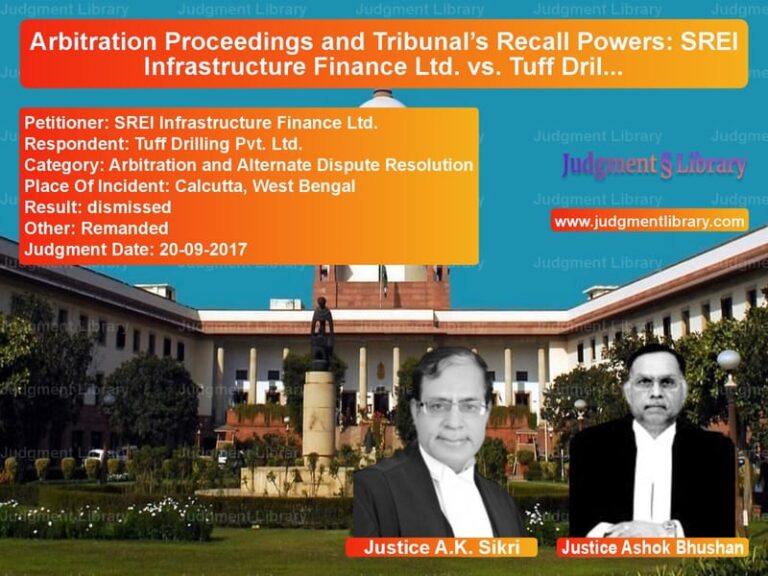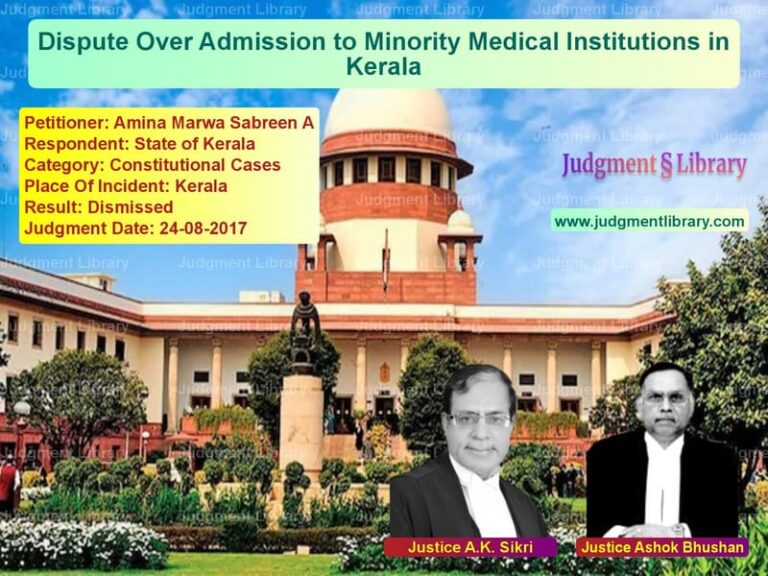Supreme Court Orders Expunction of Biased ACR Entries in Army Promotion Case
In a significant ruling that highlights the importance of fairness in military personnel assessments, the Supreme Court of India has delivered a judgment favoring a decorated Army officer who alleged biased reporting in his Annual Confidential Reports (ACRs). The case of Brigadier Sandeep Chaudhary versus the Union of India brings to light the critical role that ACRs play in determining promotions within the armed forces and the consequences when these assessments are tainted by bias.
The dispute centered around two ACRs written during Brigadier Chaudhary’s tenure as Commandant of 3 Advance Base Workshop in the Northern Command from December 2017 to June 2019. Despite having an exemplary service record spanning over three decades, numerous awards including two Vishisht Seva Medals, and previously being at the top of his batch, the officer found himself denied promotion to the rank of Major General after what he claimed were deliberately downgraded assessments.
The journey through the military justice system began when Brigadier Chaudhary submitted statutory complaints challenging his non-nomination for the NDC/APPA course and later his non-empanelment for promotion. When these complaints were rejected, he approached the Armed Forces Tribunal, which granted partial relief by expunging certain entries from one of the two disputed ACRs. Dissatisfied with this partial victory, the officer sought and obtained leave to appeal to the Supreme Court.
Read also: https://judgmentlibrary.com/pension-rights-for-absorbed-employees-supreme-court-landmark-ruling/
The Officer’s Distinguished Career
Brigadier Sandeep Chaudhary’s military career began with his commission as a Lieutenant on December 14, 1991, in the Corps of Electrical and Mechanical Engineers (now known as the Corps of Electronics and Mechanical Engineers). Over his long and distinguished service, he had served in various challenging assignments, including high-altitude areas and counter-insurgency operations. His career progression saw regular promotions, eventually reaching the rank of Brigadier.
The appellant’s counsel emphasized his client’s exceptional record, pointing out that “all throughout, the appellant’s performance was beyond excellent, which is reflected from the medals conferred on him. He pointed out that the appellant had been awarded twelve times, including two VSMs.” The officer had also undertaken several courses with instructional gradings in all graded courses and had been selected for the United Nations Mission. At the time of the dispute, he was commanding the only Research & Development establishment of the Indian Army.
The Controversial ACRs
The core of the dispute revolved around two ACRs written by the fourth respondent for the periods from December 2017 to June 2018 and July 2018 to June 2019. According to the appellant, these reports contained deliberately lowered assessments that negatively impacted his promotion prospects.
The appellant’s counsel presented several arguments challenging the fairness of these assessments. He contended that “the fourth respondent has intelligently brought down merit in the first ACR. He submitted that the fourth respondent had a biased and premeditated intent against the appellant.” The counsel pointed to evidence on record, including statements from other officers about the fourth respondent’s conduct towards the appellant.
One particularly compelling argument highlighted the inconsistency in assessments: “He pointed out that the appellant was graded ‘outstanding’ by the same IO in the first ACR. Because there was a large flair of 8s in the first ACR, the competitive rating of the appellant was brought down despite an overall Box grading of 9. Thus, presumably, grading 8 with the same assessment in the second ACR is beyond the perception of any prudent man.” The counsel also noted that both ACRs were written beyond the permitted time, raising further questions about their validity.
The ACR Assessment System
The Supreme Court took considerable care to understand and explain the ACR assessment system as regulated by Army Order AO No. 02/2016/MS. The system involves a comprehensive evaluation process with three reporting officers: the Initiating Officer (IO), the Reviewing Officer (RO), and the Senior Reviewing Officer (SRO).
The assessment uses numerical values from 1 to 9, with 9 representing ‘outstanding’ and 7 or 8 treated as ‘above average’. Part II of the ACR assesses personal qualities and demonstrated performance variables, including administrative acumen, motivation, development of subordinates, emotional stability, understanding viewpoints, foresight and understanding, loyalty and respect, judicious delegation, boldness, physical fitness, and fluency in expression.
Part III assesses potential for promotion through Qualities to Assess Potential (QsAPs), which include professional competence, vision and conceptual ability, selflessness and setting of personal example, integrity and moral courage, and tolerance for ambiguity. Importantly, while some portions of the ACR are shown to the officer being assessed, the pen pictures by the RO and SRO and the Box grading are kept confidential.
The Armed Forces Tribunal’s Decision
The Armed Forces Tribunal, in its order dated April 26, 2023, had granted partial relief to Brigadier Chaudhary. The Tribunal directed expunction of figurative ratings by the Initiating Officer and Reviewing Officer in Qualities to Assess Potential and Box gradings of the ACR for the period from July 2018 to June 2019. It also directed reconsideration of the appellant’s promotion to the rank of Major General within three months without any loss of seniority.
However, the Tribunal did not interfere with the earlier ACR covering the period from December 2017 to June 2018. This selective approach became the central issue in the Supreme Court appeal, with the appellant’s counsel arguing that “there was no reason to treat the two ACRs separately” since the basis for both assessments was the same.
The Government’s Defense
The learned Additional Solicitor General, representing the Union of India, defended the assessment process and the Tribunal’s decision. She submitted that “the Tribunal has provided cogent reasons for not interfering with the first ACR. In the second ACR, as it was found that the assessment was biased and premeditated, the Tribunal expunged it.”
The ASG explained the structured nature of the ACR assessment system and emphasized that the statutory and non-statutory complaints made by the appellant had been properly considered and disposed of. She relied on the Supreme Court’s decision in Dev Dutt v. Union of India & Ors to support the government’s position.
The Supreme Court’s Analysis
The Supreme Court bench comprising Justices Abhay S. Oka, Ahsanuddin Amanullah, and Augustine George Masih conducted a meticulous examination of the ACRs and the Tribunal’s reasoning. The Court noted the Tribunal’s crucial findings regarding the second ACR, particularly in paragraphs 34 to 36 of the impugned order.
The Court highlighted the Tribunal’s observation that “the Respondent No.4 as IO has maintained some figurative assessment in the portion of the ACR which is to be shown to the ratee, i.e., applicant and signed as seen. Whereas it is only in the part of the ACR which is not to be seen by the ratee, the IO has awarded relatively low gradings.”
Most significantly, the Tribunal had found that “Confidential reports are meant to be the appraisal of performance of the ratees. By maintaining similar figurative gradings on the disclosed part of the ACR, the reporting officers have intended to indicate the ratee that there is no downward trend in his performance during the period of report whereas in the portion of the ACR that is not disclosed to the applicant the report has distinctively indicated the intent to affect lower figurative ratings intentionally masked from the knowledge of the applicant.”
The Supreme Court found this reasoning compelling and logically applicable to both ACRs. The Court observed that “the same reasoning is applicable to the ACR of the period from 12/17 to 06/18. Unfortunately, the Tribunal has considered the case of the first ACR only in the context of the performance counselling letter dated 9th February 2018.”
The Court noted several key factors that supported uniform treatment of both ACRs: the Initiating Officer and Senior Reviewing Officer were the same for both periods; the Tribunal had already recorded a finding of intentional manipulation in the confidential portions; and the respondents had not challenged these specific findings.
The Supreme Court’s Decision
In its conclusive analysis, the Supreme Court held that “the first ACR cannot be treated differently from the second ACR.” Consequently, the Court directed that “the expunction of figurative ratings by IO and RO in QsAPs and Box grading of the ACR for the period 12/17 to 06/18 shall be made.”
The Court modified the Tribunal’s order by granting this additional relief while maintaining the relief already granted. The Supreme Court specifically directed that “reconsideration of the appellant for promotion to the rank of Major General shall be made in terms of the operative part of the first impugned order by taking into consideration the additional relief granted as above.”
Recognizing the time-sensitive nature of promotion matters, the Court added an important safeguard: “If the appellant has already superannuated, his case for the notional promotion and grant of monetary benefits shall be considered within three months from today.”
Broader Implications
This judgment has significant implications for the military justice system and personnel assessment processes in the armed forces. By upholding the principle that assessment systems must be fair, transparent, and free from bias, the Supreme Court has reinforced the importance of due process in career progression decisions.
The case highlights the vulnerability of officers to subjective assessments, particularly in the confidential portions of ACRs that remain hidden from the officer being assessed. The Court’s decision to extend the relief granted for one ACR to the other, based on the same reasoning and same reporting officers, establishes an important precedent for consistency in judicial review of administrative actions.
The three-month timeline for implementing the judgment, especially regarding notional promotion and monetary benefits for potentially superannuated officers, demonstrates the Court’s awareness of the practical consequences of delayed justice in service matters.
This ruling serves as a reminder to all assessing officers in the armed forces about their responsibility to maintain objectivity and fairness in performance evaluations. It also empowers service personnel to challenge assessments that appear arbitrary, biased, or inconsistent with their demonstrated performance.
The Supreme Court’s intervention in this case underscores the judiciary’s role as a protector of fundamental rights, even within the specialized domain of military service, ensuring that career progression is based on merit and fair assessment rather than personal biases or arbitrary considerations.
Petitioner Name: Brig Sandeep Chaudhary.Respondent Name: Union of India & Ors..Judgment By: Justice Abhay S. Oka, Justice Ahsanuddin Amanullah, Justice Augustine George Masih.Place Of Incident: Northern Command.Judgment Date: 14-05-2025.Result: allowed.
Don’t miss out on the full details! Download the complete judgment in PDF format below and gain valuable insights instantly!
Download Judgment: brig-sandeep-chaudha-vs-union-of-india-&-ors-supreme-court-of-india-judgment-dated-14-05-2025.pdf
Directly Download Judgment: Directly download this Judgment
See all petitions in Promotion Cases
See all petitions in Employment Disputes
See all petitions in Public Sector Employees
See all petitions in Disciplinary Proceedings
See all petitions in Judgment by Abhay S. Oka
See all petitions in Judgment by Ahsanuddin Amanullah
See all petitions in Judgment by Augustine George Masih
See all petitions in allowed
See all petitions in supreme court of India judgments May 2025
See all petitions in 2025 judgments
See all posts in Service Matters Category
See all allowed petitions in Service Matters Category
See all Dismissed petitions in Service Matters Category
See all partially allowed petitions in Service Matters Category







